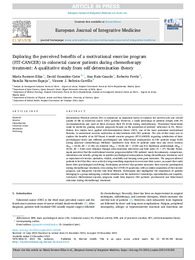Título :
Exploring the perceived benefits of a motivational exercise program (FIT-CANCER) in colorectal cancer patients during chemotherapy treatment: A qualitative study from self-determination theory |
Autor :
Romero-Elías, María 
González-Cutre, David 
Ruiz-Casado, Ana 
Ferriz, Roberto 
Navarro-Espejo, Natalia 
Beltrán-Carrillo, Vicente J.  |
Editor :
Elsevier |
Departamento:
Departamentos de la UMH::Ciencias del Deporte |
Fecha de publicación:
2023-12-23 |
URI :
https://hdl.handle.net/11000/33008 |
Resumen :
Introduction: Physical activity (PA) is considered an important factor to enhance the survival rate and overall
quality of life in colorectal cancer (CRC) patients. However, a small percentage of patients comply with PA
recommendations and most of them decrease their PA levels during chemotherapy. Theoretical frameworks
could be useful for guiding exercise programs focused on the promotion of patients’ adherence to PA. Nevertheless, few studies have applied self-determination theory (SDT), one of the most prominent motivational
theories, to understand exercise motivation in interventions with CRC patients. The aim of this study was to
explore the benefits of an SDT-based 6-month exercise program (FIT-CANCER) regarding satisfaction of basic
psychological needs and different psychological and behavioural consequences in CRC patients (stage II-III)
during adjuvant chemotherapy. Methods: Qualitative data from 16 patients (nine men and seven women;
Mage = 64.00, SD = 11.58), six relatives (Mage = 55.00, SD = 15.09) and five healthcare professionals (Mage =
40.40, SD = 9.66) were obtained through semi-structured interviews and field notes (N = 27). Results: Participants perceived that the motivational exercise program satisfied CRC patients’ needs for autonomy, competence,
relatedness and novelty, giving rise to positive psychological consequences during chemotherapy treatment, such
as enjoyment of exercise, optimism, vitality, sociability and keeping some good memories. The program allowed
patients to feel that they were actively doing something important to overcome their cancer, an aspect that could
foster their psychological well-being. Participants perceived that patients increased their exercise participation
during chemotherapy treatment, even during the COVID-19 pandemic, with an online adaptation of the exercise
program, and integrated exercise into their lifestyle. Participants also highlighted the importance of patients
belonging to a group undergoing a similar situation and the instructor’s knowledge, specialization and empathy.
Conclusion: Motivational exercise programs could help improve CRC patients’ psychosocial and behavioural
outcomes during chemotherapy treatment.
|
Palabras clave/Materias:
Exercise
Chemotherapy
Colorectal cancer
Motivation
Well-being |
Área de conocimiento :
CDU: Bellas artes: Diversiones. Espectáculos. Cine. Teatro. Danza. Juegos.Deportes |
Tipo de documento :
info:eu-repo/semantics/article |
Derechos de acceso:
info:eu-repo/semantics/openAccess
Attribution-NonCommercial-NoDerivatives 4.0 Internacional |
DOI :
https://doi.org/10.1016/j.eujim.2023.102328 |
Publicado en:
European Journal of Integrative Medicine, Volume 65 , January 2024 |
Aparece en las colecciones:
Artículos Ciencias del Deporte
|
 La licencia se describe como: Atribución-NonComercial-NoDerivada 4.0 Internacional.
La licencia se describe como: Atribución-NonComercial-NoDerivada 4.0 Internacional.
.png)
